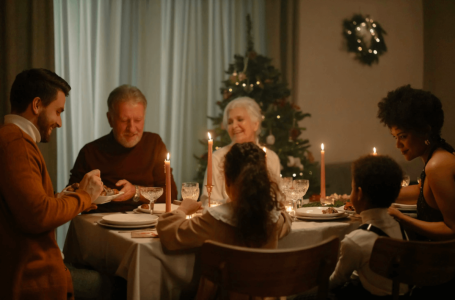How to Help Protect the Mental Health of Loved Ones Living with Eating Disorders this Christmas Season
- Replies 2
Christmas should be a time of joy and celebration when we gather around the family dinner table and prepare for the New Year.
But for the hundreds and thousands of Aussies living with an eating disorder, this time of year can be a challenge, causing stress and worry.
Conversations about 'summer bodies' and 'New Year's resolutions' might lead us to consider our own fitness and diets, but for people struggling with an eating disorder, the pressure of food-based discussions and good-natured banter can be too much.
Leah Ward, the parent of a young adult recovering from an eating disorder, shared her experience of these situations with a media outlet.
'A person with an eating disorder has a lot of noise in their head,' she explained. 'Gatherings are noisy, busy and very much focused around food and connection, which is obviously a wonderful thing.'
'But the noise, the busyness and the food elements – and everyone's discussions around needing to go on a diet or go and exercise to run off what they had for lunch – those sorts of comments are really difficult.'

We understand that for those of you who may have a loved one suffering from an eating disorder, it can be hard to know how to celebrate Christmas with them and how you can help protect their mental health.
Jane Rowan, Executive Director of Eating Disorders Families Australia (EDFA), has some tips for you on how to approach being mindful and supportive of those with eating disorders in your life.
Don't talk about needing to 'diet' after eating 'too much' at Christmas.
Be aware that the conversations and comments around food, diets, and health can be overwhelming and triggering. Being conscious before presenting those topics of discussion would be greatly appreciated.
Try not to single anyone out or put them in a situation where they have to have the spotlight shone on them, and more importantly, don't force them to make dietary choices.
Never comment on anyone's appearance.
Refrain from commenting on visual appearances and on the amount of food consumed at the table.
It's also important to resist the urge to talk about diets or weight-loss plans and to be careful with discussions of 'thin' or 'fit' bodies, as this can be upsetting for people with eating disorders.
Strive to make the person feel appreciated and included in the festivities.
It's not just about the actual conversations — it's also the entire atmosphere that we create when we get together with friends or family.
When we pay attention to the atmosphere and try to make it as calm and inclusive as possible, everyone can really benefit.

Even though it's all about Christmas, not to mention eating and enjoying ourselves… We still need to remember to be mindful of others around us – especially our loved ones.
If you or someone you care about is living with an eating disorder, or if you want to learn more about the options available for support and recovery, Butterfly Australia's national helpline is 1800 33 4673. You can also get support and chat with them online through this link.
From everyone here at the SDC, we send our warmest wishes for a Merry Christmas and a happy holiday season for you and your family, and may you all find joy and comfort in each other's company.
What are your thoughts on this topic? Share them with us in the comments!
But for the hundreds and thousands of Aussies living with an eating disorder, this time of year can be a challenge, causing stress and worry.
Conversations about 'summer bodies' and 'New Year's resolutions' might lead us to consider our own fitness and diets, but for people struggling with an eating disorder, the pressure of food-based discussions and good-natured banter can be too much.
Leah Ward, the parent of a young adult recovering from an eating disorder, shared her experience of these situations with a media outlet.
'A person with an eating disorder has a lot of noise in their head,' she explained. 'Gatherings are noisy, busy and very much focused around food and connection, which is obviously a wonderful thing.'
'But the noise, the busyness and the food elements – and everyone's discussions around needing to go on a diet or go and exercise to run off what they had for lunch – those sorts of comments are really difficult.'

For those living with eating disorders, the festive season can be especially challenging. Credit: Pexels/cottonbrostudio.
We understand that for those of you who may have a loved one suffering from an eating disorder, it can be hard to know how to celebrate Christmas with them and how you can help protect their mental health.
Jane Rowan, Executive Director of Eating Disorders Families Australia (EDFA), has some tips for you on how to approach being mindful and supportive of those with eating disorders in your life.
Don't talk about needing to 'diet' after eating 'too much' at Christmas.
Be aware that the conversations and comments around food, diets, and health can be overwhelming and triggering. Being conscious before presenting those topics of discussion would be greatly appreciated.
Try not to single anyone out or put them in a situation where they have to have the spotlight shone on them, and more importantly, don't force them to make dietary choices.
Never comment on anyone's appearance.
Refrain from commenting on visual appearances and on the amount of food consumed at the table.
It's also important to resist the urge to talk about diets or weight-loss plans and to be careful with discussions of 'thin' or 'fit' bodies, as this can be upsetting for people with eating disorders.
Strive to make the person feel appreciated and included in the festivities.
It's not just about the actual conversations — it's also the entire atmosphere that we create when we get together with friends or family.
When we pay attention to the atmosphere and try to make it as calm and inclusive as possible, everyone can really benefit.
Key Takeaways
- People living with eating disorders may find the festive season to be challenging and overwhelming, so it is important to be mindful and courteous to ensure everyone at the table is comfortable.
- Try to avoid comments about food portions, choices and physical appearance to make the person living with an eating disorder feel more included.
- There are numerous avenues for support available, so it is important to seek out help and spread awareness as soon as possible.
If you or someone you care about is living with an eating disorder, or if you want to learn more about the options available for support and recovery, Butterfly Australia's national helpline is 1800 33 4673. You can also get support and chat with them online through this link.
From everyone here at the SDC, we send our warmest wishes for a Merry Christmas and a happy holiday season for you and your family, and may you all find joy and comfort in each other's company.
What are your thoughts on this topic? Share them with us in the comments!







